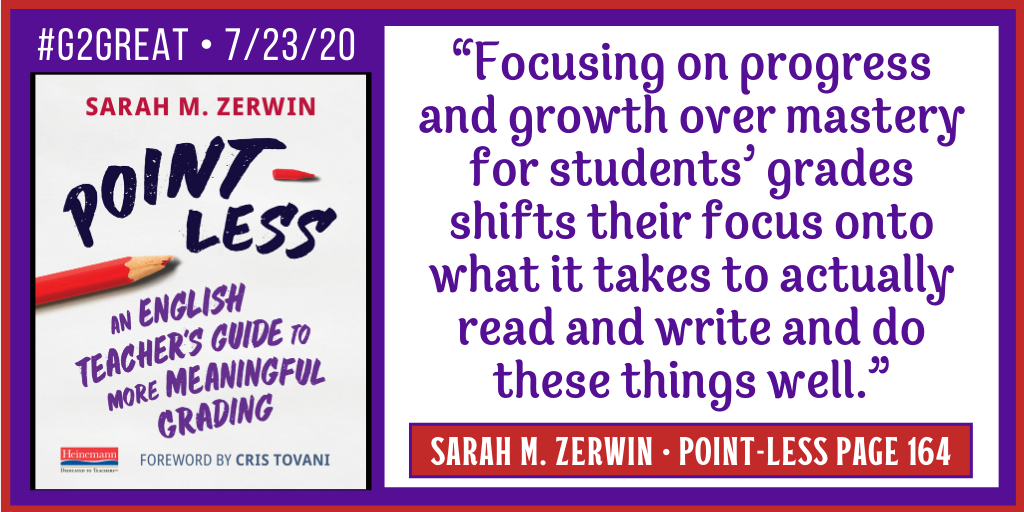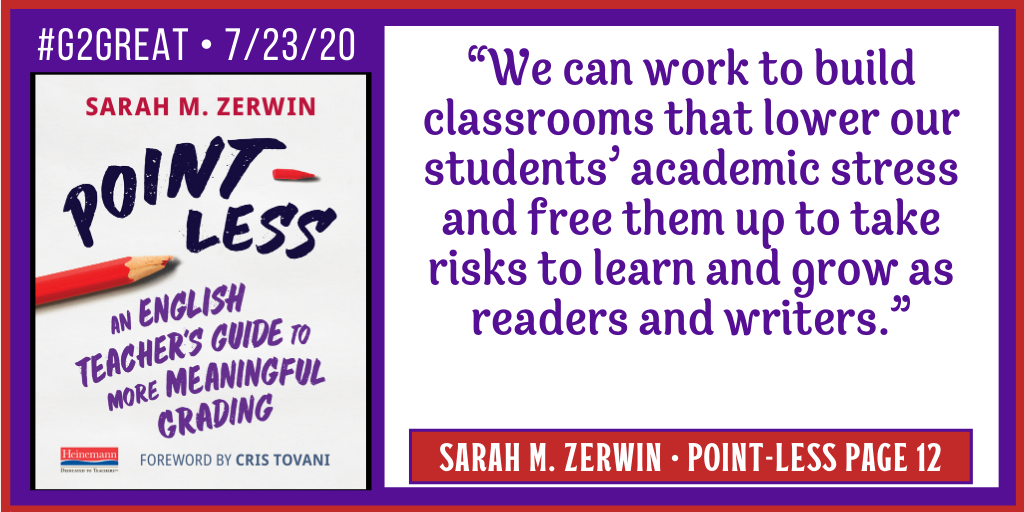
A pandemic, an economic crisis, and ubiquitous social unrest are begging us all to wake up and take notice of all that is fundamentally wrong within our society and public systems. Teachers, in particular, are at a crossroads to consider what we value most. What practices do we cling to as we face an uncertain start to school? Sometimes a book comes along at exactly the right moment. I think this is one of those times. Sarah Zerwin has written the book, Point-Less: An English Teacher’s Guide to More Meaningful Grading, to help us find a better way forward.
Decreasing the emphasis on numeric grades while creating a classroom culture that embraces risk and celebrates learning is a value that requires action on our part. Any big important work begins with big important questions: Why this book? Why right now? Why is it so important that we move beyond numeric grades alone? How can we begin this shift to a more holistic assessment system in our classrooms? What if we were able to tap into students’ motivation? Just asking these questions makes me feel dizzy with excitement.

Why this book, why now?
Sarah recalls her initial motivation for writing her book:
I got to the point several years ago where I could finally see clearly how the focus on points and grades in my classroom was getting in the way of my students doing authentic work as readers and writers, and I just couldn’t do it anymore. The book captures a process I landed on after quite a bit of trial and error, and I hope that process helps my readers to think through how they might grade more meaningfully in their classrooms, in ways that work for their particular teaching contexts. I want my students to read and write so they can make sense of our complex world and use their voices to impact it; when they were focused on grades and points, they weren’t doing this important work.
Sarah M. Zerwin
When the Numbers Don’t Add Up…
Becoming a literate citizen of the world requires more than just a passing grade. A numeric grade is just one part of a bigger picture. Sarah inspires us to consider how we can grow our instructional practice to be more inclusive of our students.
Just because our districts or schools provide us with numbers-based grade books to keep track of our students’ work doesn’t mean that’s how we must get to our students’ final grades. We can design a different path that invites our students to read and write in ways that matter to their lives rather than focusing on collecting points. We can put learning solidly at the center of our classrooms so they orbit around that rather than the points-based exchange that centers the traditional grading system.
Sarah M. Zerwin
Intrinsic Motivation Leads to Realizing Potential!
Believing that students will embrace learning for learning’s sake is easier than you’d think. To make this a reality it requires a little time, a little trust, and lots of relationship building.
Our students want to do work that matters to them. They know exactly how a traditional grading focus gets in the way. Talk to them honestly about this and listen carefully–they’ll tell you what they need. It’s definitely a leap of faith to leave the traditional grading system behind, but once your students trust that you are really, truly stepping out of the grading game, they’ll follow you.
Sarah M. Zerwin

Thank you, for guest hosting #G2Great and for your leadership by writing this insightful and practical book, Sarah. If you believe that your students are more than a number, then here are some links to help you get this work started in your own classrooms:
- To view a sample of the book, Point-Less An English Teacher’s Guide to More Meaningful Grading visit Heinemann: https://www.heinemann.com/products/e10951.aspx
- Sarah Zerwin’s Blog: http://thepapergraders.org/
- Sarah Zerwin’s Podcast: https://blog.heinemann.com/podcast-moving-to-a-points-free-system-sarah-zerwin